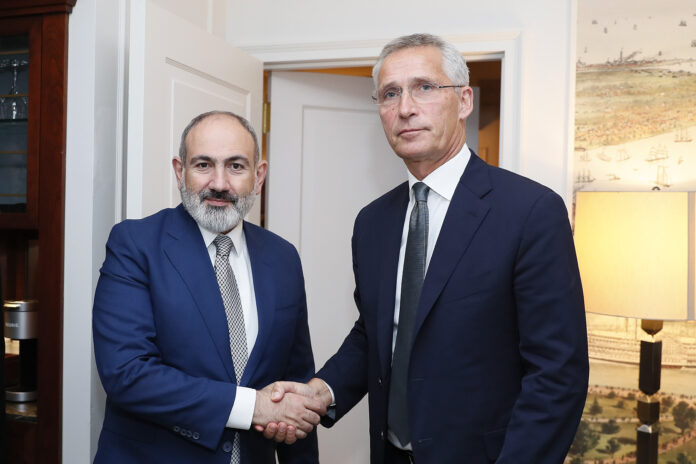YEREVAN (Combined Sources) — NATO Secretary General Jens Stoltenberg visited both Armenia and Azerbaijan this week, urging both to have closer cooperation with the organization.
During a joint press conference with Armenian Prime Minister Nikol Pashinyan on March 19, the latter called for firm support from the international community, including NATO, for the peace process between Armenia and Azerbaijan based on known and mutually agreed-upon principles. He also emphasized the unequivocal rejection of the policy of coercion and threats.
“I presented to Mr. Stoltenberg the vision and approaches of the Government of the Republic of Armenia to establishing stability and peace in the South Caucasus. I reaffirm my repeatedly voiced willingness to normalize relations with Azerbaijan based on the 3 principles agreed at the highest level, namely, recognition of each other’s territorial integrity based on the Alma-Ata Declaration, the delimitation of the Armenia-Azerbaijan interstate border according to the Alma-Ata Declaration for restoring the border that existed at the time of the collapse of the USSR in 1991 between the two republics, as well as the unblocking of regional infrastructures, respecting the sovereignty and jurisdiction of the countries they pass through, based on the principles of equality and reciprocity. Regarding the latter, I have also presented the “Crossroads of Peace” project, which summarizes our ideas on the issue,” Pashinyan added.
He added, “I also presented to the General Secretary the proposals for a simultaneous withdrawal of troops from the Armenia-Azerbaijan border of 1991, mutual arms control, and the signing of a non-aggression pact, which have not received a positive response from official Baku to date.”
Pashinyan noted that Armenia is also “committed to the agenda of normalizing relations with Turkey.”
He concluded, “Of course, we are interested in deepening cooperation with NATO, and I hope that the individually tailored program for Armenia will be adopted as soon as possible. As you are aware, we are currently undergoing significant reforms, and I trust that this program will prove beneficial for our foreign agenda as well.”










